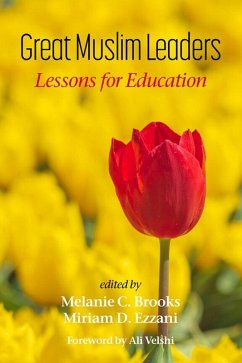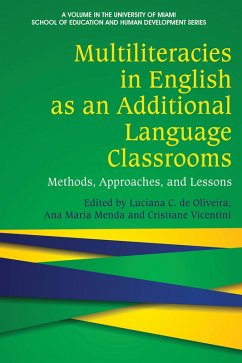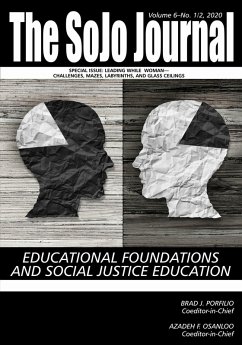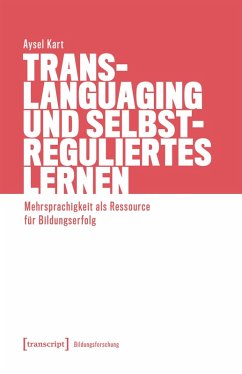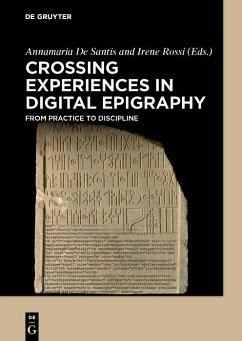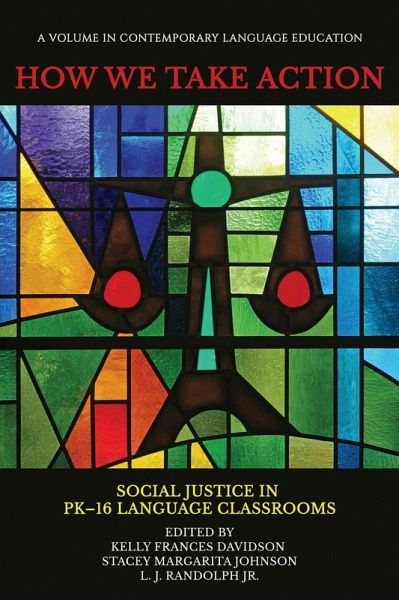
How We Take Action (eBook, PDF)
Social Justice in PK-16 Language Classrooms
Redaktion: Davidson, Kelly Frances; Randolph, L. J.; Johnson, Stacey Margarita
Versandkostenfrei!
Sofort per Download lieferbar
80,60 €
inkl. MwSt.
Weitere Ausgaben:

PAYBACK Punkte
0 °P sammeln!
How We Take Action brings together practical examples of social justice in language education from a wide range of contexts. Many language teachers have a desire to teach in justice-oriented ways, but perhaps also feel frustration at how hard it is to teach in ways that we did not experience ourselves as learners and have not observed as colleagues. As a profession, we need more ideas, more examples, and wider networks of allies in this work. This book includes the work of 59 different authors including teachers and researchers at every level from Pre-K to postsecondary, representing different...
How We Take Action brings together practical examples of social justice in language education from a wide range of contexts. Many language teachers have a desire to teach in justice-oriented ways, but perhaps also feel frustration at how hard it is to teach in ways that we did not experience ourselves as learners and have not observed as colleagues. As a profession, we need more ideas, more examples, and wider networks of allies in this work. This book includes the work of 59 different authors including teachers and researchers at every level from Pre-K to postsecondary, representing different backgrounds, languages, and approaches to classroom practice.Organized into three sections, some of the chapters in this collection report on classroom research while others focus on key practices and experiences. Section I is entitled Inclusive and Empowering Classrooms. In this section authors take a critical approach to classroom practices by breaking with the status quo or creating spaces where students experience safety, access, and empowerment in language learning experiences. Section II, Integration of Critical Topics, addresses a variety of ways teachers can incorporate justice-oriented pedagogies in day-to-day instructional experiences. Social justice does not happen haphazardly; it requires careful, critical examination of instructional practices and intentional planning as instructors hope to enact change. Section III, Activism and Community Engagement, explores how teachers can empower students to become agents for positive change through the study of activism and constructive community engagement programs at local and global levels.ENDORSEMENTS:This volume brings an important diversity of voices, contexts, and collaborations to the ongoing conversations about social justice in language education. University experts in social justice in language education and nationally celebrated K-12 language teachers are included along with experienced practitioners whose voices are often not prioritized in scholarship. The volume serves as an invitation to the reader to engage, reflect, consider, and examine different approaches to teaching for social justice. Chapters bring in feminist pedagogies, critical pedagogies, LGBTQ affirming pedagogies, anti-bias and anti-racist approaches, decolonial lenses, critical media literacies, and more Everyone who picks up this volume will find at least one piece that immediately resonates with them, and then will be inevitably drawn in to the other engaging and thoughtful chapters. - Pamela M. Wesely, The University of IowaThis book is a must-read for those interested in social justice in language education. The range of authors, topics, languages, institutional contexts, and pedagogies is staggeringly impressive and will provide any reader with ideas and inspiration for taking action in and out of the language classroom. - Kate Paesani, University of MinnesotaThis excellent volume, replete with thoroughly researched strategies for promoting social justice in PK-16 world language instruction, could not have come at a more critical time in the United States when anti-democratic forces are mobilizing against equity and justice-oriented education. We in the field of language education are very fortunate to have this collection of work from more than 50 language learning scholars and practitioners, who remind us that making our classrooms more equitable, inclusive, and grounded in justice is part of doing our jobs more effectively. What's more, the volume clearly demonstrates its prioritization for inclusivity by providing robust support for those who teach young learners at the pre-kindergarten through grade 3 levels-a population woefully underrepresented in language teaching literature-and for topics that have been unjustly ignored in language education, such as racism, sexism, and the needs of LGBTQIA learners. This is a clear demonstration of the volume's uniqueness in its vast breadth of scope and attention, which is the book's most valuable feature and why it will serve our field wonderfully for many years to come. - Uju Anya, Carnegie Mellon University
Dieser Download kann aus rechtlichen Gründen nur mit Rechnungsadresse in A, B, BG, CY, CZ, D, DK, EW, E, FIN, F, GR, HR, H, IRL, I, LT, L, LR, M, NL, PL, P, R, S, SLO, SK ausgeliefert werden.






